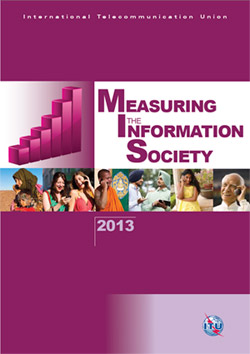| |
ICT Development Index (IDI) |
 |
| |
 |
International Telecommunication Union (ITU)
Measuring The Information Society - 2013
- The results of the 2012 ICT Development Index (IDI) show that there are major differences in ICT levels between countries. In 2012, IDI values ranged from a low of 0.99 (Niger) to a high of 8.57 (Republic of Korea) – within the possible (theoretical) range of 0 to 10. At the same time, nearly all countries increased their IDI values between 2011 and 2012, demonstrating that ICT levels continue to mature throughout the world. In 2012, the average IDI value climbed to 4.35, up about 5 per cent from 4.15 in 2011.
- A comparison between 2011 and 2012 shows that, over this time period, both the maximum and minimum IDI values had increased, meaning that ICT levels are maturing not only in countries at the top but also in those at the very bottom.
- The IDI 2012 includes a total of 157 countries. The top ten IDI countries are predominantly from Europe and from Asia and the Pacific. While the Republic of Korea, with the highest IDI value of 8.57, continues to lead the world in terms of ICT developments, the Nordic countries Sweden, Iceland, Denmark, Finland and Norway follow closely. The Netherlands, the United Kingdom, Luxembourg and Hong Kong (China) also rank in the top ten.
- Between 2011 and 2012, there was hardly any change in the top ten IDI economies and only one country – the United Kingdom – joined the group from its previous 11th position. The group of the top 30 economies saw similarly few changes, suggesting that the countries that have reached high ICT levels – usually through a high and long-standing degree of liberalization and privatization and focused ICT policies – remain at the top. The ranking further
highlights the link between income and education levels and ICT development: all of the top 30 economies in the IDI are high-income economies that share a high level of skills.
- All top ten IDI countries have reached very high levels of ICT access and use, and share a number of characteristics. These include highly competitive ICT markets and ICT services that were privatized and liberalized early on.
- All top performers benefit from abundant international Internet bandwidth, a highly developed backbone, and solid fixed-broadband infrastructure. Fixed-broadband penetration exceeds 30 per cent in every one of the top ten economies.
- More than four out of five people in the top ten economies are online. In Iceland, Norway and Sweden, between 94 and 96 per cent of the population are using the Internet. In the Republic of Korea, over 97 per cent of households have access to the Internet, and the figure is over 90 per cent in the Netherlands (94 per cent), Luxembourg and Norway (93 per cent) and Denmark and Sweden (92 per cent).
- In the Republic of Korea, where ICT continues to be a key priority area, by 2012 nearly all households had high-speed Internet access and the country enjoyed one of the highest average advertised broadband speeds in the world. ICTs have helped the Republic of Korea to become a robust economy, and overcome the 2008 financial crisis. They have driven growth and innovation, increased transparency and made the country one of the key ICT exporters in the world.
- Most of the top performers in the IDI were also early adopters of Long Term Evolution (LTE) wireless technology, and they include the first countries to offer these mobile-broadband services commercially. In Europe, Sweden and
Norway were the first countries to offer LTE, as early as end 2009. By early 2012, about half of the population of Sweden lived in a place that had coverage by one of the 4G networks. In the Republic of Korea, where LTE services
were launched in 2011, nationwide coverage was achieved by April 2012.
|
| |
 |
|
|